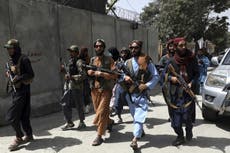Who are the Hazara people of Afghanistan?
Ethnic minority from mountainous Hazarajat historically discriminated against for Shia faith
What is their history?
The Hazaras are an ethnic minority native to the impoverished, mountainous Hazarajat region of central Afghanistan.
They are thought to be descendants of the Mongol warlord Ghengis Khan, whose conquering army swept through the country in the 13th century, and speak Hazaragi, a Farsi dialect.
They account for approximately nine per cent of the country’s 38m population, according to Minority Rights Group International, but consider themselves routinely discriminated against for their Shia Muslim faith - at odds with the majority of Afghans who follow Sunni Islam - a situation that briefly appeared to be improving when Hamid Karzai appointed six Hazara members to a recent cabinet but which now looks as bleak as ever with the return of Taliban rule.
“Even open-minded non-Hazaras, with a high degree of education, have admitted to me that they feel a certain discomfort when they encounter Hazaras in certain positions of authority in Afghanistan,” anthropologist Melissa Chiovenda of the University of Connecticut told Al Jazeera. “They feel they should still be servants and labourers.”
Despite commonly being regarded with suspicion, the Hazaras largely retained their regional autonomy until 1880 when the Pashtun king, Abdul Rahman Khan, sought to bring their homeland under his command, ordering his troops to lay siege to the Hazaras and committing atrocities when they encountered resistance, in what became known as the Hazara Uprisings.
Khan’s men spared the population of southern Hazarajat when it bowed to his authority but continued to persecute tribal leaders in the north until 1893, murdering its menfolk and selling women and children into slavery.
The conflict resulted in the minority’s mass displacement and much hardship, a fate that would be inflicted upon them once more a century later by another tyrannical Pashtun force.
Khan’s son and heir, Habibullah Khan, did offer amnesty to the Hazaras in 1901 but the divisions had already been sown between the group and wider Afghan society, the distrust and isolation lingering for much of the 20th century.
Why are they being targeted by the Taliban?
The Deobandi fundamentalist movement, formed originally in the mid-1990s during the Afghan Civil War from ex-mujahideen resistance fighters who had battled occupation by the Soviet Union in the 1980s, seeks to return the country to an imagined past of unsullied religious purity.
As such, it is opposed to any group whose understanding of Islam does not match its own.
“Hazaras are not Muslims, you can kill them,” Taliban commander Maulawi Mohammed Hanif reportedly told a crowd of 300 summoned to a northern mosque in the mid-1990s as his group seized control of the nation.
“Wherever you go we will catch you,” Mullah Manon Niazi, the Taliban-appointed governor of Mazar-i-Sharif, warned them in threatening radio broadcasts in the same period. “If you go up, we will pull you down by your feet; if you hide below we will pull you up by your hair.”
These threats preceded a massacre in Niazi’s city in August 1998, which saw Taliban fighters going from door to door and indiscriminately executing every Hazara male they encountered, according to a Human Rights Watch (HRW) investigation, as part of a campaign to eradicate the minority and in revenge for the deaths of Taliban soldiers killed while attempting to take Mazar-i-Sharif the previous summer.
“During the house-to-house searches, scores and perhaps hundreds of Hazara men and boys were summarily executed, apparently to ensure that they would be unable to mount any resistance to the Taliban,” HRW concluded.
In a further outrage in 2001, Taliban leader Mullah Mohammed Omar ordered the destruction of the Buddhas of Bamiyan, stone sentinels carved into the rock face to guard over the Silk Road in the sixth century and since protected as UNESCO World Heritage Site, an act of cultural desecration in Hazara territory again intended as a brutish act of dominance over them.
Omar’s group would soon find itself forced from power by the US-led invasion of Afghanistan at the outset of the War on Terror, only to subsequently regroup as an insurgent militia.
Why are we asking this now?
Taliban militants tortured and killed several Hazaras once again this summer as they swept through Afghanistan, according to Amnesty International, the human rights organisation reporting that witnesses told it that the militant group had carried out a massacre of their people in early July in the town of Ghazni, about 90 miles southwest of Kabul.
Amnesty said nine Hazara men were killed in the Malistan district in eastern Ghazni between 4 and 6 July after examining photographic evidence and interviewing witnesses.
“The cold-blooded brutality of these killings is a reminder of the Taliban’s past record, and a horrifying indicator of what Taliban rule may bring,” said Agnes Callamard, Amnesty’s secretary-general.
“These targeted killings are proof that ethnic and religious minorities remain at particular risk under Taliban rule in Afghanistan.”
The Islamist group has since seized control of Kabul in the wake of the US military withdrawal from the country and is pledging a more tolerant reign than it demonstrated when it last governed between 1996 and 2001, a period marked by brutal authoritarianism, the oppression of women and complete bans on western-influenced culture.
Few in the international community are convinced by the moderate front the Taliban is now attempting to present to the world, however, and the capital’s airport remains the scene of chaos as thousands attempt to flee the country to escape the extremists’ expected wrath as world leaders bicker and blame one another for the failure to anticipate and contain what could turn into a fully-fledged humanitarian disaster.
Join our commenting forum
Join thought-provoking conversations, follow other Independent readers and see their replies
Comments


Bookmark popover
Removed from bookmarks